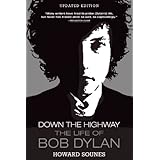
Average Reviews:

(More customer reviews)I'm 53 years old with three kids, a job, and a life-long obsession with Bob Dylan that isn't going away. To this day, his best songs make the hairs on the back of my neck stand up. But who is this guy? And where does such extraordinary music come from? Perhaps recognizing that there are never really answers to questions like these, Howard Sounes largely sidesteps them in this excellent new biography, which doesn't pretend to reveal very much about Dylan's mind or the creative wellspring for his work. What the book does succeed at giving us is a thoroughly professional, well-researched and clearly written account of the man's life. Characteristically, Dylan refused to be interviewed, as did, apparently, his immediate family members. However, Mr. Sounes obtained a wealth of material from an array of other people, including childhood and adult friends, lovers, band members, business associates, observers, hangers-on, and the many famous and non-so-famous musicians and singers who have known and worked with Dylan over the course of four decades. Sounes even took in perspectives from individuals referenced in Dylan's songs, like William Zantzinger - the real-life and still-living villain from The Lonesome Death of Hattie Carroll - and Carla Rotolo, the stigmatized "parasite sister" from Ballad in Plain D. Because he's made a career of fleeing the constraints of identity, Dylan is a resistant subject for biography. Born into a nurturing middle-class Jewish family in small-town Minnesota, Dylan (then Bob Zimmerman), came of age and, following a short time at college, took to the road, and to disguise his embarrassingly conventional roots, invented outlandish myths about himself as a singing orphan hobo. Personally shy, but far less innocent than he appeared, he in fact had an overpowering ambition and confidence in his talent. Heading straight for New York City - the right place at the right time - he quickly "made it" as the angst-ridden folk and social-protest singer we know from his early recordings. He had no sooner achieved fame in this persona than he shed it like a snakeskin, reinventing himself as the seemingly nihilistic rock-and-roll poet who was to help establish the foundation for the emerging 60's counter-culture. However, this too was largely an act, and by the time the world was catching up with him, he had moved on again. At the very peak of the late 1960's cultural revolution in America, when rebellious post-adolescents were reaching out to him as a kind of Messiah, Dylan turned his back again and went conventional, retreating to a reclusive, short-haired, family-oriented lifestyle with his wife Sara and the beginnings of a family that would eventually include five remarkably well-cared-for children. Sounes suggests that this was the least contrived period of Dylan's life and the happiest. However, it wasn't to endure either, and his loving, private relationship with Sara finally broke down in bitterness and divorce. Just as the 60's lost steam and the hippies were cutting their hair and getting jobs, Dylan - forever out of cycle - resumed his scruffy, intense, hip-hillbilly style and hit the road again. His conversion to a kind of fundamentalist Christianity in the late 1970's was the most startling of his metamorphoses, and one which befuddled fans will look to this book in vain for Sounes to shed much light on. The author doesn't disparage it, but doesn't appear to get it either, any more than the fans did. Moreover, he seems to lose touch with his subject to some degree from this point on in the book. But then one gets the sense that Dylan was losing touch with himself too, putting out a series of lackluster albums and abandoning himself to endless and apparently aimless roadtouring and womanizing, not really renouncing his religion so much as back-burning it because it was hurting his career. The biography tries to end on a high note by discussing Time Out of Mind, Dylan's latest release at the time of publication. Receiving critical aclaim, the album indeed displays revived sparks of his old genius, but anyone who has experienced the stark, death-haunted tone that pervades it can't be very cheered by this paradoxical show of vitality. One feels that Sounes is whistling beside the graveyard at the end of his book. I for one believe that the hype that has surrounded Dylan for most his career is justified, and that he will probably be remembered as one of the great artists of the late-twentieth century, whether his work cheers us up or not at this stage of life. While Sounes' book fails to reveal his elusive subject, it is by far the best biographical material about Bob Dylan that has appeared to date, and I recommend it.
Click Here to see more reviews about: Down the Highway: The Life of Bob Dylan
Click here for more information about Down the Highway: The Life of Bob Dylan

0 comments:
Post a Comment